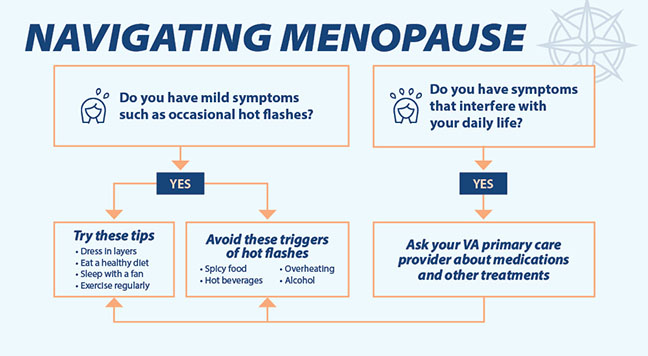Are you experiencing hot flashes? Sudden mood changes? Having trouble sleeping? You may be nearing menopause. If your symptoms are making you uncomfortable, talk with your VA provider for help managing them.
Menopause is a natural part of aging. It happens when your body naturally stops making hormones and you have not had a menstrual period for 12 months in a row. Symptoms, however, can begin 2 to 8 years before menopause, a time called perimenopause.
Menopause may also happen if you have surgery that includes the removal of your ovaries. This is called “surgical menopause” and is often accompanied by symptoms such as hot flashes and night sweats.
Most common symptoms
Your menopausal symptoms may occur occasionally or frequently. The most common symptoms include:
- Irregular periods, which may be longer or shorter, and/or lighter or heavier;
- Hot flashes;
- Night sweats;
- Sleep problems;
- Mood changes;
- Vaginal dryness, which may make sexual activity uncomfortable or painful;
- Changes in interest in sexual activity;
- Weight gain;
- Thinning hair and dry skin;
- Loss of breast/chest fullness;
- Anxiety or depression. These symptoms may be worse for those who have post-traumatic stress disorder (PTSD). Talk to your VA primary care provider if you are experiencing mental health concerns.
Low-dose estrogen therapy for relief from hot flashes and night sweats
If your menopausal symptoms are affecting your daily life, treatments are available at VA. These include non-hormonal medications and hormone therapy. The most effective treatment is hormone therapy, which includes estrogen therapy and progesterone therapy.
Hormone therapy is safe for most people and comes in different forms, such as pills, patches or creams. Low-dose estrogen therapy, usually a pill or a patch, is most effective for relief from hot flashes and night sweats. Progesterone therapy is needed with estrogen therapy if you still have your uterus. It is important to talk with your VA provider about the best options for you.
Other methods of easing menopause symptoms include:
- Using Whole Health practices like yoga, tai chi and mindfulness.
- Eating a nutritious diet and incorporating regular exercise into your daily routine.
- Avoiding triggers of hot flashes, such as drinking hot beverages or alcohol, getting overheated (such as sitting in the hot sun), and eating spicy food.
Some symptoms may slow down after menopause, but your risk for some conditions – vaginal dryness, urinary incontinence, heart disease and osteoporosis – may increase.
Additional resources that you may find helpful include:
- Menopause Brochure.
- Vaginal and Urinary Symptoms of Menopause Brochure.
- Women’s Health webpage: Menopause.
The symptoms of menopause should not keep you from living your best life. Talk with your VA primary care provider to decide the best treatment options for you.
Topics in this story
More Stories
Veteran Byron Potier weighed almost 300 pounds and was tired and lethargic. He was the perfect candidate for gastric sleeve surgery.
How much do you know about VA care, benefits and services? Don’t miss out on what you've earned—check out the "2025 VA Federal Benefits Guide for Veterans, Dependents, Survivors, and Caregivers" handbook to learn more.
Feeling stressed? Your breath can help you relax and focus. Take 3 minutes to reset and prioritize your well being for this week's #LiveWholeHealth practice.








I told my provider today that menopause symptoms were my chief complaint but he didn’t offer estrogen/progesterone therapy through the VA. I’m currently paying cash for prescriptions through a TRICARE network provider. Hmmm…
I all but begged my provider to help me. It been a year without a period and ten years with irregular periods. I was “too young” for that. Lol I also was diagnosed with Lupus and Fibromyalgia for 15 years before I entered the VA health care system. The last doctor I had spent the last three years trying to prove the 6 civilian docs wrong, so I just suffer.
Does this include bio identical hormone therapy?
I decreased my sugar and process carbs intake and the hot flashes are 90% gone. Eat real food, exercise (30 minute daily walk counts), get enough sleep, and hydrate ladies!
Sadly women are not being told that HRT is a first line of defense for thinning bones resulting from menopause. Also, HRT has the same side effects/risks as birth control pills and does not cause the side effects as ‘bone drugs’.
Thank you for finally not pushing antidepressants down our throats as a treatment for menopause symptoms. Most antidepressants cause hot flashes as a LISTED side effect yet doctors don’t bother to read the label. How many women have been tortured by the “excessive sweating” listed as a common side effect on antidepressants only to be told by their doctor “Oh, you probably need to increase the dosage to get rid of the hot flashes”. What no one tells you is that the higher dosing just makes the sweating worse!